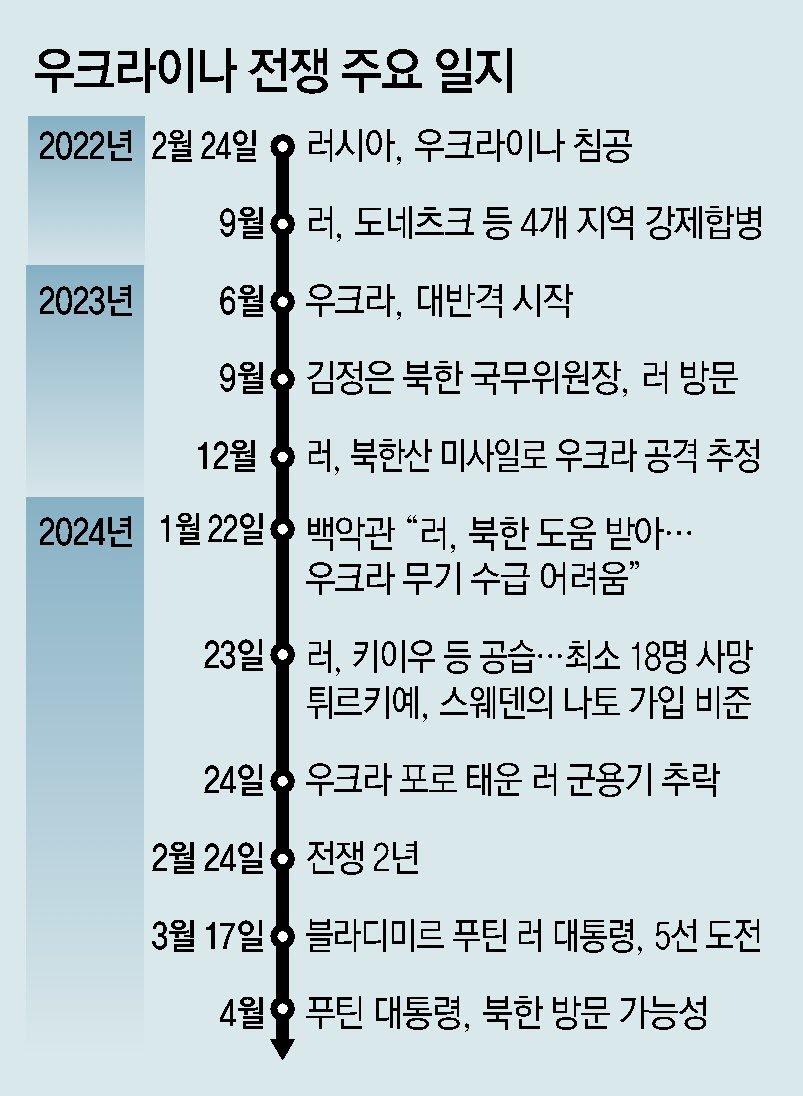Russia fires 40 missiles at Kiiu, etc.
Ukraine: At least 18 dead, 130 injured
There were 74 people on board, including 65 Ukrainian prisoners.
Russian transport plane crashes… Looks like everyone died
As the Ukraine War, which broke out on February 24, 2022, marks its second anniversary next month, Russia is digging into Ukraine’s weaknesses due to lack of support from the West. On the 23rd, Russia carried out large-scale airstrikes on Kiev, the capital of Ukraine, and Kharkiv, the second largest city. The situation occurred at a time when the war between Israel and the Palestinian armed group Hamas broke out in October last year, and the United States, Ukraine’s largest supporter, focused on domestic agendas ahead of the presidential election in November, and the West’s interest in the war in Ukraine was declining.
However, Turkye (Turkey), a member of the North Atlantic Treaty Organization (NATO), voted on the same day to ratify Sweden, which neighbors Russia, to join NATO. Sweden was a neutral country for a long time, but after the outbreak of the war in Ukraine, it shifted toward the West and is at odds with Russia.

According to the Associated Press, the Russian military launched more than 40 different missiles across Ukraine on the 23rd. At least 18 people were killed and more than 130 injured in this airstrike.
According to Reuters and political media outlet Politico, U.S. Assistant Secretary of Defense Celeste Wallander criticized, “Russia launched a precision attack with missiles and drones to find weaknesses in Ukraine, where U.S. funding was cut off.” This means that Russia is exploring places that are vulnerable to attack due to a lack of military supplies such as ammunition. However, he also acknowledged that the Ukrainian military is depleting ammunition and weapons due to the withdrawal of U.S. support.
The $61.4 billion (approximately 82 trillion won) additional support budget submitted by the U.S. Joe Biden administration has not passed the congressional threshold due to opposition from the opposition Republican Party, the majority party in the House of Representatives. Accordingly, the U.S. arms support budget for Ukraine ended at $250 million (about 335 billion won) at the end of last year.
On the other hand, Russia is strengthening its offensive thanks to North Korea’s support. Following North Korean Chairman Kim Jong-un in September last year, North Korean Foreign Minister Choe Son-hee recently visited Russia, and military cooperation between the two countries is also strengthening. The New York Times reported on the 22nd that concerns are growing that Russia could overwhelm Ukraine’s air defense network by receiving North Korea’s latest missiles. John Kirby, strategic communications coordinator for the White House National Security Council (NSC), also said that Russia is procuring ballistic missiles and drones from North Korea and Iran, respectively, and called for active support for Ukraine.
On the 24th, a Russian military transport plane carrying 65 Ukrainian prisoners of war, 6 crew members, and 3 companions crashed in Belgorod, southern Russia, near the border between the two countries. The exact cause of the accident is not yet known. However, all on board are presumed dead. According to the Guardian and BBC, some retired Russian generals raised the possibility that Ukraine was responsible, saying that the plane was shot down by three missiles supplied to Ukraine by the West.
On the 23rd, the Turkiye Parliament passed a bill to ratify Sweden’s accession to NATO. NATO membership requires unanimous consent from 31 member countries. So far, only Türkiye and pro-Russian Hungary have not agreed, but some say that the ‘9-minute ridge’ of final accession has been crossed.
Neutral countries Sweden and Finland pushed for NATO membership immediately after the outbreak of the war in Ukraine due to concerns that they could become Russia’s next target. Finland joined in April last year. Türkiye delayed giving his consent for a long time on the grounds that Sweden supports the Kurdish minority, which seeks independence within the country. Hungarian Prime Minister Viktor Orbán also announced on the 23rd through social media X (formerly Twitter) that he would discuss joining NATO with Swedish Prime Minister Ulf Kristersson.
However, even in the European Union (EU), the passage of the Ukraine support budget is sluggish. The EU is seeking to provide 50 billion euros (about 72 trillion won) in support to Ukraine between 2024 and 2027, but Hungary is also opposing it.
Paris =
Source: Donga
Mark Jones is a world traveler and journalist for News Rebeat. With a curious mind and a love of adventure, Mark brings a unique perspective to the latest global events and provides in-depth and thought-provoking coverage of the world at large.